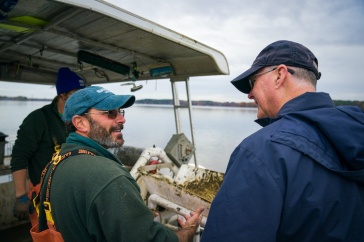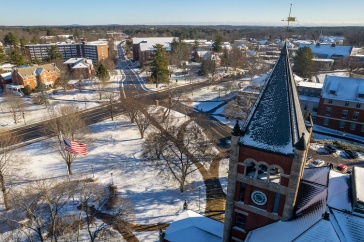
Community and environmental planning captsone class members with Professor Mary Friedman
Sometimes hands-on learning means momentarily losing feeling in your fingertips.
Such was the case for nearly a dozen UNH students during a particularly bitter morning in the spring, as they canvased downtown Farmington to complete a First Impressions Survey for a capstone course in community and environmental planning in partnership with UNH’s Cooperative Extension.
The students snapped hundreds of photos – the camera in professor Mary Friedman’s iPhone briefly froze in the frosty conditions – and documented their overall impressions en route to creating a comprehensive presentation that they ultimately delivered to the Farmington board of selectmen, offering suggestions on how to beautify the downtown and make it more pedestrian-friendly in hopes of attracting new residents and satisfying current ones.

For the students, many of whom intend to work in the municipal planning and development realm, the opportunity to partner with a local community provided an invaluable chance to escape the traditional learning environment and perhaps be at the forefront of a downtown revitalization that could have their – albeit icy – fingerprints all over it.
Applying Concepts to the Real World
“There’s a big difference between learning in the classroom and applying that knowledge in the real world,” says Zac Fangman ’19. “Being off-campus offered a unique learning experience that prepared me for aspects of a career in planning that aren’t always covered in a classroom, like interacting with citizens and experiencing communities first-hand.”
Such is precisely the goal of Friedman’s capstone class, which is designed to allow students to apply the knowledge they’ve gained from fundamental coursework to the real world through areas like data collection and analysis, reporting, presenting and more.
“This experience was really cool for me because I have a background in the more theoretical side of economics, so it was great to apply it here and really see how it can affect average people’s lives and how you can use a lot of the theory that you know in a really applicable way,” says Zachary Kay ’19.
Friedman partners with Extension to find local municipalities in need of such assistance, and Extension acts as “the bridge between the students and the town” to get the process moving, says Molly Donovan, community economic development state specialist with Extension.
“It’s hard to tell who is more excited about that exchange, the students or the community members,” quips Donovan. “It’s really bringing it all together – it reminds us that Extension is here to bring the best part of the university and student work out to communities and allow us to be teaching in towns alongside community members and students. So it’s the very best of our work.”
And there’s certainly plenty of work that goes into it. For Donovan, who develops relationships with local towns and determines which ones are in a place where an assessment makes sense before connecting them with Friedman, and also for the students, who in this case met with town officials prior to putting any boots on the ground and later returned for the First Impression Survey, a parking survey, and the presentation to the selectmen.
“It’s important to learn concepts and material, but allowing students the opportunity to apply what they’ve learned gives you a totally different understanding,” says Jonathan Gagne ’20. “It made the work we were doing much more meaningful knowing we could be creating something that would be seen and potentially utilized by a local community.”
Added Jessica Bighinatti ’19: “Talking to local residents is exciting because you get to learn so much about what is important to them, and what they are really proud of in their community. It’s great to know that our research and work will benefit a small town and its citizens in many ways.”
Presenting Recommendations
The First Impression Survey was the largest undertaking, resulting in a 71-slide PowerPoint presentation that was delivered to the selectmen last May along with suggestions for how to beautify and revitalize the downtown area.
The students examined everything from displays and signage to landscaping and lighting, parks and points of interest and sidewalks, crosswalks and trails. The end result wasn’t to suggest any drastic overhauls but rather to encourage small upgrades and touches throughout the downtown that will add up to a more aesthetic overall picture.
“A major thing I took away was how all of the recommendations we presented were not very extravagant,” Jade Long says. “I think it’s just sticking to basics when it comes to the visual aesthetic and leaving a good first impression. It’s simple things – the paint looking well-kept, the green spaces being maintained. I don’t think a community needs extravagant or expensive things to look like a great community.”
 Farmington agrees. One of the most beneficial characteristics of the student feedback is that it matched up extremely well with what board members had already heard from town residents, Angela Hardin, chair of the Economic Development Committee and Downtown Revitalization Committee, says.
Farmington agrees. One of the most beneficial characteristics of the student feedback is that it matched up extremely well with what board members had already heard from town residents, Angela Hardin, chair of the Economic Development Committee and Downtown Revitalization Committee, says.
It was particularly helpful given the age demographic from which the feedback came.
“What it did for us primarily is reinforce what we had already heard from the townspeople,” says Hardin. “It was nice to hear that from somebody outside, that they kind of see things the way we see things. It’s an outside perspective, from a generation that we want to see move to Farmington in larger numbers. Thing they saw as assets – like the historic look and feel – we can use that to reinforce exactly what the community is saying, to strengthen that argument.”
Learning 188体育app_188体育在线-平台官网 For All
Official implementation of any suggestions will take some time, Hardin noted, as any changes would require additional presentations to and sign-off from town boards. But almost all of the suggestions the students made were received positively.
That certainly showed in the way the UNH cohort was received. Local businesses welcomed the students with open arms, offering them pizza and soda as they conducted their research. And Friedman wandered over to investigate a growing crowd outside of one municipal building only to discover it was a monthly community supper – which she immediately received an invitation to.
That experience – of witnessing the innerworkings of a living, breathing community – is the most rewarding part of the process for the students, Friedman said. And it has pretty significant tangible results when it comes to the next steps after UNH.
“You can see the whole spectrum, because they come in as freshmen and they’re so young, and to see them develop professionally, it’s heartwarming,” Friedman says. “They come in as kids, but they really do leave as professionals.”
Added Long, who intends to work in the planning field: “A class like this makes you feel better about yourself, that you’re trying to help other people. A lot of classes don’t really get to that feeling with just lectures and tests. This gives you that experience and knowledge that you would never have gained otherwise.”
-
Written By:
Keith Testa | UNH Marketing | keith.testa@unh.edu



















































